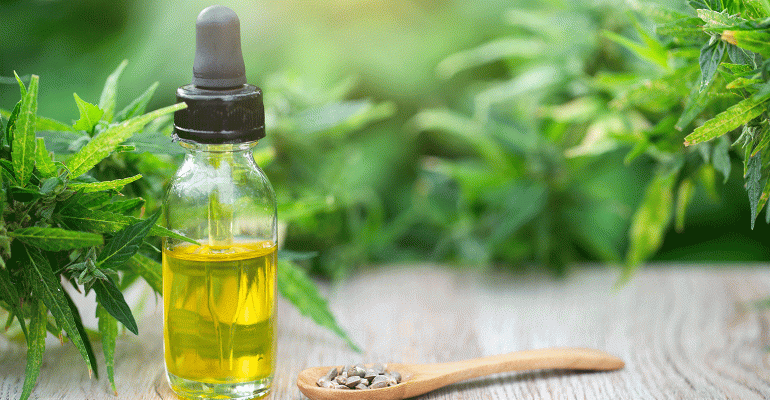Cannabidiol, or CBD, is growing in popularity as consumers grow more comfortable with the hemp cannabis extract, according to new research by the NPD Group, and restaurant operators are keeping a close eye on its legal and consumer developments.
The NPD Group on Wednesday said nearly 20% of adults have tried CBD in states where it’s legal and nearly half of them have used it recently.
“This number is expected to increase quickly as CBD is appearing in snack foods and beverages, consumers are getting more comfortable with the idea and just as many people plan to try it as are currently using it,” NPD said.
“We are in the midst of one of the most remarkable and complex legal and cultural shifts in American history,” Shawn Stevens, founder of the Milwaukee, Wis.-based Food Industry Counsel LLC, told the annual Food Safety Symposium Monday in Las Vegas. “A new product. A new market. It’s unbelievable.” The 14th annual Nation’s Restaurant News conference, sponsored by Ecolab Inc., gathered more than 30 corporate food safety leaders to discuss trends and topics.
NPD’s Health Aspirations and Behavioral Tracking Service found consumers considered food and beverage a major pathway for CBD and 40% of them were seeking to better themselves with food and beverage choices.
“There is definitely interest on the part of consumers in CBD, but its future in the mass market is dependent on legalization, which is now a patchwork of state legislation,” said Darren Seifer, NPD’s food and beverage industry analyst, in a statement. “Even with the complexities of legalization, consumer acceptance and adoption of CBD as a food and medicine is an important topic for food manufacturers to keep on their radar screens.”
CBD use in the restaurant space is “fraught with a little bit of risk,” Stevens said at the Food Safety Symposium, citing local laws and the Food and Drug Administration’s oversight.
“We continue to watch very closely the development of the laws and regulations surrounding CBD, what the FDA is doing and how quickly it is going to be doing it and what the final result will ultimately look like,” Stevens said. “I predict, moving forward, that the FDA will legalize CBD for use in food products.”
Joel Chappelle, a food industry lawyer and co-presenter with Stevens, said CBD adoption and legislation like the 2018 Farm Bill, which differentiated hemp cannabis from marijuana cannabis, “is happening so quickly that ultimately that the federal government has been cornered by its own policies over the past decades.”
Chappelle said that in 1996 cannabis was illegal in all U.S. jurisdictions. But now, 11 states have legalized marijuana for recreational or medicinal use, and it has drawn supporters such as retired U.S. House Speaker John Boehner, lifestyle expert Martha Stewart, actor Morgan Freeman and investor Peter Thiel.
“The state of the law, however, despite these advances and billions of dollars that are now being generated as a result of cannabis, remains very confusing,” Chappelle said.
Earlier this year, a number of local health departments, from New York to Ohio and Maine to Georgia, cracked down on restaurants and bars serving CBD, but a number of multi-unit brands from Fresh&Co to Carl’s Jr. offered items with CBD.
Doug Davis, senior director for global food safety with Bethesda, Md.-based Marriott International, told the Food Safety Symposium that his company is poised to take advantage of CBD approvals. Marriott International has more than 10,000 restaurants under more than 30 brands, as well as spas and wellness centers.
“We have convinced our executive team,” Davis said. “We have convinced our senior v.p. for food and beverage that we need to be in this space. And we need to be in it as soon as it’s possible.”
Davis said Marriott has already talked with Chicago chef Mindy Segal, who has partnered with Crestco Labs, the largest marijuana cultivator in Illinois, and created Mindy’s Artisanal Edibles and Mindy’s Hot Chocolate.
“Obviously, our customers are asking about it,” Davis said. “We’re using it in spas with CBD topicals in California and Colorado.”
Experts said many questions remain about CBD’s use, such as quality assurance on sources of CBD and allowable amounts safe for consumption.
“Nobody’s actually putting a tincture of CBD in any food and selling it,” Davis noted. “They are doing condiments — like a pesto or chimichurri — or they are doing sachet bags.”
CBD’s addition to drinks has been one of the more generally accepted uses, he said.
“We’re watching the legal situation very, very closely,” Davis said.
“We’re poised and ready to do all these things,” he said. “And we want to be the first in the industry to do them.”
Correction Sept. 27, 2019: This story has been edited to correct the spelling of Joel Chappelle, the food industry consultant and lawyer.
Contact Ron Ruggless at [email protected]
Follow him on Twitter: @RonRuggless





